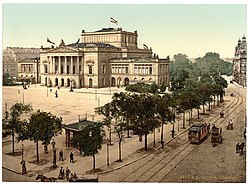


The Leipzig Opera (German : Oper Leipzig) is an opera house and opera company located at the Augustusplatz and the Inner City Ring Road at its east side in Leipzig's district Mitte, Germany.



The Leipzig Opera (German : Oper Leipzig) is an opera house and opera company located at the Augustusplatz and the Inner City Ring Road at its east side in Leipzig's district Mitte, Germany.
Performances of opera in Leipzig trace back to Singspiel performances beginning in the year 1693. [1] The composer of many early operas at the first opera house, the Oper am Brühl, was Telemann. He was director of the house from 1703 to 1705. [2]
The Leipzig Opera does not have its own opera orchestra – the Leipzig Gewandhaus Orchestra performs as its orchestra. This relationship began in 1766 with performances of the Singspiel Die verwandelten Weiber, oder Der Teufel ist los by Johann Adam Hiller.

The previous theater (the "Neues Theater") was inaugurated on 28 January 1868 with Jubilee Overture by Carl Maria von Weber and the overture for Iphigénie en Aulide by Gluck and Goethe's play Iphigenia in Tauris . [3] From 1886 to 1888, Gustav Mahler was the second conductor; Arthur Nikisch was his superior. During an air raid in the night of 3 December 1943, part of the bombing of Leipzig in World War II, the theater was destroyed, as were all of Leipzig's theatres.
Construction of the modern opera house began in 1956. The theater was inaugurated on 8 October 1960 with a performance of Wagner's Die Meistersinger von Nürnberg . [4]
Ulf Schirmer became Generalmusikdirektor (General Music Director, or GMD) of the company in 2009. He was elected artistic director (Intendant) in 2011 for a five-year term. [5] Schirmer stood down from both posts in 2022.
Tobias Wolff became Intendant of the company in 2022. [6] Christoph Gedschold became music director of the company as of the 2022–2023 season. In May 2023, the company announced that Gedschold is to stand down as its music director as of the close of the 2023–2024 season. [7]
Several operas received their premiere in Leipzig, including: